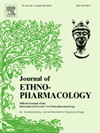投稿信息
稿件收錄要求
The Journal of Ethnopharmacology is dedicated to the exchange of information and understandings about people''s use of plants, fungi, animals, microorganisms and minerals and their biological and pharmacological effects based on the principles established through international conventions. Early people confronted with illness and disease, discovered a wealth of useful therapeutic agents in the plant and animal kingdoms. The empirical knowledge of these medicinal substances and their toxic potential was passed on by oral tradition and sometimes recorded in herbals and other texts on materia medica. Many valuable drugs of today (e.g., atropine, ephedrine, tubocurarine, digoxin, reserpine) came into use through the study of indigenous remedies. Chemists continue to use plant-derived drugs (e.g., morphine, taxol, physostigmine, quinidine, emetine) as prototypes in their attempts to develop more effective and less toxic medicinals. In recent years the preservation of local knowledge, the promotion of indigenous medical systems in primary health care, and the conservation of biodiversity have become even more of a concern to all scientists working at the interface of social and natural sciences but especially to ethnopharmacologists. Recognizing the sovereign rights of States over their natural resources, ethnopharmacologists are particularly concerned with local people''s rights to further use and develop their autochthonous resources. Accordingly, today''s ethnopharmacological research embraces the multidisciplinary effort in the: ? documentation of indigenous medical knowledge, ? scientific study of indigenous medicines in order to contribute in the long-run to improved health care in the regions of study, as well as ? search for pharmacologically unique principles from existing indigenous remedies. The Journal of Ethnopharmacology publishes original articles concerned with the observation and experimental investigation of the biological activities of plant and animal substances used in the traditional medicine of past and present cultures. The journal will particularly welcome interdisciplinary papers with an ethnopharmacological, an ethnobotanical or an ethnochemical approach to the study of indigenous drugs. Reports of anthropological and ethnobotanical field studies fall within the journal''s scope. Studies involving pharmacological and toxicological mechanisms of action are especially welcome. Clinical studies on efficacy will be considered if contributing to the understanding of specific ethnopharmacological problems. The journal also welcomes review articles in the above mentioned fields especially on novel methodologies relevant to disease states.


員@2x.png)

